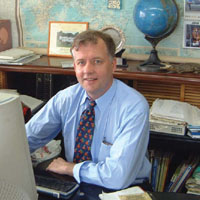Bridging the Gap
Back to Contents of Issue: July 2003
|
|
|
|
by David Wolman |
|
 AT A SAPPORO COFFEE shop, Simon Jackson puts down his cafeau lait and glances over a news item in the International Herald Tribune. He begins nodding. "Oh good, good. Fantastic. This is going to be great." AT A SAPPORO COFFEE shop, Simon Jackson puts down his cafeau lait and glances over a news item in the International Herald Tribune. He begins nodding. "Oh good, good. Fantastic. This is going to be great."
The article is about Tokyo Gas Co. negotiating with Royal Dutch/Shell Group to become the first customer to buy natural gas from Sakhalin Energy, the Sakhalin, Russia-based consortium led by Shell. (In May, Tokyo Gas signed a contract to buy 1.1 million tons of liquefied natural gas per year for the next 24 years.)
"American and European firms often know a lot about Russia," explains Jackson, a New Zealander who came to Sapporo 10 years ago, skied 45 days that first winter and never looked back. "But when employees from those firms arrive in the Russian Far East, especially to Sakhalin Island, geographic reality sets in." Moscow is more than 10,000 kilometers away, and the proximity of Japan, and Hokkaido in particular, means Japan will likely play a critical role in business operations as varied as materials purchasing, construction and even catering. Yet most western professionals in Russia have little or no experience dealing with Japanese business styles and customs. That's where Jackson and his fledgling company, Northpoint-Network come in.
"I was talking with a very senior oil executive in Sakhalin recently about working with the Japanese. 'Don't you try to communicate with them?' I asked him. He said he'd like to, but he couldn't make sense of the Japanese approach. The style is missed."
Many westerners don't Many Westerners, says Jackson, don't have the ability or patience to do business with the Japanese because they're unfamiliar with the nuances, time, effort, connections and track record that are essential for successful negotiations. Conversely, the Japanese, especially companies in Hokkaido that have little experience outside their domestic markets, are often uncomfortable doing business with Russians, despite the growing business potential of the northwestern Pacific region.
Mild-mannered and never too serious, the 40-year-old Kiwi says he's aiming for the crumbs in Sakhalin; and there are a lot of crumbs to be had when some of the biggest companies in the world set up multi-billion dollar operations just across the way. Or in this case, just across La Perouse Strait.
"Simon Jackson knows more about Sakhalin and Russo-Japan business relations than anyone around here," says Arudou Debito, an activist and well-known Sapporo personality. It is precisely Jackson's presence here that is the key. He insists that dozens, perhaps hundreds of people in the US or Australia are capable of doing what he's doing, but because he's here in Sapporo, he has a distinct advantage.
"The big boys, Exxon and Shell, are in Sakhalin, and they're looking at the big picture. They have to buy 100-ton cranes, caterpillars and all that's necessary for oil and gas production. Lack of a 100-ton crane can hold up a project, but so can the lack of a hammer," says Jackson. From Sapporo, he can provide those hammers -- and a lot more.
Sakhalin Energy plans to build a liquefied natural gas facility on Sakhalin, and most likely a Japanese firm will build it. Those hundreds of construction workers will need to eat, says Jackson. For another project on Sakhalin involving Japanese labor, he's already working with a Western catering service on a Japanese-style menu and making orders for Japanese-made kitchen machines. Jackson's business includes consultation, but as he puts it: "You can get paid for teaching something or get paid to just do it. They [the oil and gas companies] need equipment and we say, 'here it is and this is the price.'" This includes not only kitchen machines, but also other equipment: tires, cars, portable toilets, compressors, generators, small backhoes, heaters and more.
"Look at the California Gold Rush," he says, putting his finger again on the article in the Tribune. "Who got rich? Levi Strauss did, by providing peripheral goods and services."
Oil and gas development in Sakhalin may or may not result in a boom comparable to the Gold Rush. But there's no question the sudden infusion of foreign dollars that has already arrived in the region translates into new business opportunities for someone like Jackson. Recently, he got together with the owner of an Indian restaurant in Sapporo and a Yuzhno-Kurilsk (Sakhalin) businessman to open an Indian restaurant in Yuzhno-Kurilsk. Next on the agenda: a hotel.
For Jackson, the work is also rewarding because he is able to bring together Japanese and Russian businesses, and in a small way catalyze better relations between the two countries.
As a non-Russian gaijin, Jackson benefits by steering clear of antagonism on either side. Far from politicians in Moscow and Tokyo, Sakhalin and Hokkaido are perhaps the best places to begin burying feelings of mutual dislike and building mutually beneficial businesses. Based on his own experiences, Jackson believes people on both sides of La Perouse Strait want improved relations with their neighbors. Because of the oil and gas development off Sakhalin, this corner of the globe is receiving increased attention and investment. And right there is Jackson, positioning himself at the corner of the banquet table, eager to feast on the crumbs. @ |
|
Note: The function "email this page" is currently not supported for this page.





